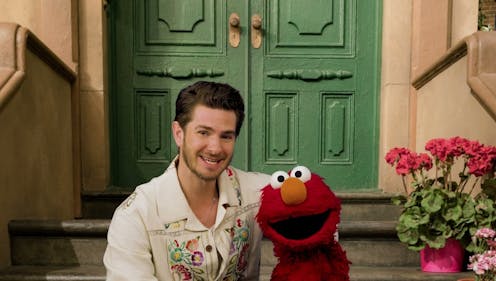
When was the last time you heard someone talk in detail about their grief?
For many of us, it could be rarely or never. There are several reasons for this.
Grieving people often avoid raising the topic in conversation because they want to avoid upsetting or burdening people. Family and friends of grieving people often feel unsure or uncomfortable about asking them to talk about it, fearing they will infringe on the person’s privacy. One study of grieving adults in Australia and Ireland showed nearly one-third said they didn’t receive the support they would have liked. Some experts note we tend to deny or minimise others’ grief, increasing their isolation.
Actor Andrew Garfield, best known for playing Spiderman, appeared on Sesame Street last week and spoke with Elmo in moving and affirming ways about grieving his mother’s death. Clips of their short conversation have been widely shared on social media. It presents a great example of communicating well about grief.
Kids grieve too
Issues around grief and isolation can be the same for children and young people as for older people.
In fact, grief in young people is recognised as “the last taboo in public health”. By the age of 18, around one in 20 children have a parent die. Even more will experience grief following the deaths of other close people such as siblings and grandparents. Children also grieve the deaths of pets. Yet we struggle to acknowledge, let alone understand and help them with the grief.
Due to a desire to protect them from harm or distress, adults are often reluctant to talk about dying and death with children. We also underestimate their abilities to understand such difficult topics. My recent work with Lionheart Camp for Kids shows such good intentions leave grieving children with many unanswered questions.
So it was great to see Andrew Garfield (who has discussed the topic before on talk shows and in interviews) share his experience on children’s television.
Read more: 'Why did he Leve Me?' 5 things grieving children want to know about the death of a loved one
It takes two (or more)
Their exchange begins with the character of Elmo checking in with Garfield, to see if he’s OK. He asks in a warm and open-ended way.
What Garfield communicates well is checking if Elmo is willing and comfortable to hear him talk about his thoughts and feelings. He conveys his feelings of grief and speaks about how missing someone is due to love. He shares his understanding about the comforting role memories can bring to the bereaved, and about recognising a deceased person can be celebrated and missed at the same time.
Elmo also does a great job of listening. He normalises Garfield’s thoughts and feelings, and gently affirms his memories of his deceased mother. Importantly, Elmo doesn’t make the conversation about himself or resort to tired clichés like “this shall pass” or “she’d want you to move on”. He doesn’t minimise his discomfort with jokes or provide unsolicited advice on how to feel or behave.
Social support in the wake of loss helps grieving people – if it’s done right. Too often, however, it’s not, and can leave grieving people more distressed.
Though an almost universal need, providing effective social support for grieving people is a complex process. It must involve:
a potential supporter recognising the bereaved person’s need for support
support that is available, sufficient and offered to the bereaved
them perceiving the support as helpful.
Perceptions of whether an offer if support is useful can depend on where it comes from, the type of support, whether it is offered at the right time, and the griever’s level or receptiveness or social isolation.
Listening, validating, support
Garfield and Elmo aren’t the first celebrities to talk openly about grief.
But in daily life, it’s rare to hear anyone talk openly about these feelings. That’s why it’s so refreshing when people in the public eye break the taboo that surrounds grief and loss. It is important for grieving people of all ages to be able to talk about their grief and be listened to. For potential supporters, it is enriching to think about they can listen, validate and support.
As Garfield and Elmo show, grieving people and their support people can work together to develop a compassionate connection in a conversation that benefits both parties.
Lauren Breen receives funding from Healthway and has previously received funding from Wellcome Trust, Australian Research Council, Department of Health (Western Australia), Silver Chain, iCare Dust Diseases Board (New South Wales), and Cancer Council (Western Australia). She is on the board of Lionheart Camp for Kids and is a member of Grief Australia and the Australian Psychological Society.
This article was originally published on The Conversation. Read the original article.







